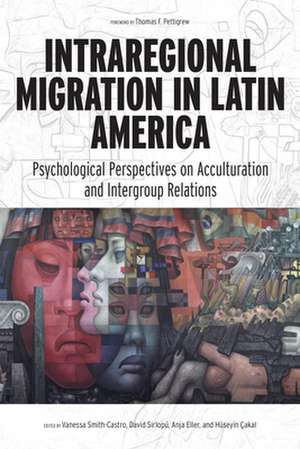Intraregional Migration in Latin America – Psychological Perspectives on Acculturation and Intergroup Relations: Psychology in Latin America
Autor Vanessa Smith–castro, David Sirlopú, Anja Daniela Eller, Hüseyin Çakal, Judith Gibbonsen Limba Engleză Paperback – 15 mar 2021
Preț: 445.39 lei
Preț vechi: 484.11 lei
-8% Nou
Puncte Express: 668
Preț estimativ în valută:
85.23€ • 91.14$ • 71.06£
85.23€ • 91.14$ • 71.06£
Carte indisponibilă temporar
Doresc să fiu notificat când acest titlu va fi disponibil:
Se trimite...
Preluare comenzi: 021 569.72.76
Specificații
ISBN-13: 9781433833809
ISBN-10: 1433833808
Pagini: 270
Dimensiuni: 197 x 228 x 17 mm
Greutate: 0.39 kg
Editura: Wiley
Seria Psychology in Latin America
ISBN-10: 1433833808
Pagini: 270
Dimensiuni: 197 x 228 x 17 mm
Greutate: 0.39 kg
Editura: Wiley
Seria Psychology in Latin America
Cuprins
Foreword
Thomas F. Pettigrew
Introduction: Intraregional Migration in Latin America From a Psychological Perspective
Vanessa Smith-Castro, David Sirlopú, Anja Eller, and Hüseyin Çakal
Part I. Intercultural Contact and Acculturation
Chapter 1. South-South Migration in Chile: Well-Being and Intergroup Relations Between Latin-American Immigrants and Host Society Members
María José Mera-Lemp, Gonzalo Martínez-Zelaya, Marian Bilbao, and Aracely Orellana
Chapter 2. Acculturation Strategies and Multicultural Identity in Bolivia: Influences of a Plural Society
Eric Roth and Adriana Méndez
Chapter 3. Acculturation in International Students in Argentina: Factors That Predict Adaptation
Alejandro Castro Solano and María Laura Lupano Perugini
Chapter 4. My Home, My Rules: Costa Rican Attitudes Toward Immigrants and Immigration
Vanessa Smith-Castro, Eugenia Gallardo-Allen, and Mauricio Molina-Delgado
Part II. Intergroup Relations and Social Change
Chapter 5. Exploring Discrimination and Prejudice in Education: Contributions From Social Psychology to the Immigrant Phenomenon in Chile
Natalia Salas, Dante Castillo, David Huepe, Luis Eduardo Thayer Correa, and Felipe Kong
Chapter 6. Disadvantage, Contact, and Health Among Indigenous People in Mexico and Chile
Anja Eller, Hüseyin Çakal, and David Sirlopú
Chapter 7. Socio-Ideological Beliefs and Perspective Taking Versus the Two-Headed Dragon: A Latin American Prejudice Story, as Told in Argentina
Carlos M. Díaz-Lázaro, Jeremías D. Tosi, Luz M. Castro, and Carolina E. Borgeat-Linares
Chapter 8. "What Brings Us Together and Sets Us Apart": Regional Identities and Intergroup Relations as the Basis of Peruvian National Identity in Samples from Ayacucho and Lima
Rosa María Cueto, Agustín Espinosa, and Harry Lewis
Chapter 9. “They Are Close to Us, but We Are So Different From Them”: Prejudice Toward Immigrants and Indigenous Peoples in Brazil
Valdiney V. Gouveia, Rafaella C. R. Araújo, and Taciano L. Milfont
Conclusion: Implications for Future Research
Vanessa Smith-Castro, David Sirlopú, Anja Eller, and Hüseyin Çakal
Thomas F. Pettigrew
Introduction: Intraregional Migration in Latin America From a Psychological Perspective
Vanessa Smith-Castro, David Sirlopú, Anja Eller, and Hüseyin Çakal
Part I. Intercultural Contact and Acculturation
Chapter 1. South-South Migration in Chile: Well-Being and Intergroup Relations Between Latin-American Immigrants and Host Society Members
María José Mera-Lemp, Gonzalo Martínez-Zelaya, Marian Bilbao, and Aracely Orellana
Chapter 2. Acculturation Strategies and Multicultural Identity in Bolivia: Influences of a Plural Society
Eric Roth and Adriana Méndez
Chapter 3. Acculturation in International Students in Argentina: Factors That Predict Adaptation
Alejandro Castro Solano and María Laura Lupano Perugini
Chapter 4. My Home, My Rules: Costa Rican Attitudes Toward Immigrants and Immigration
Vanessa Smith-Castro, Eugenia Gallardo-Allen, and Mauricio Molina-Delgado
Part II. Intergroup Relations and Social Change
Chapter 5. Exploring Discrimination and Prejudice in Education: Contributions From Social Psychology to the Immigrant Phenomenon in Chile
Natalia Salas, Dante Castillo, David Huepe, Luis Eduardo Thayer Correa, and Felipe Kong
Chapter 6. Disadvantage, Contact, and Health Among Indigenous People in Mexico and Chile
Anja Eller, Hüseyin Çakal, and David Sirlopú
Chapter 7. Socio-Ideological Beliefs and Perspective Taking Versus the Two-Headed Dragon: A Latin American Prejudice Story, as Told in Argentina
Carlos M. Díaz-Lázaro, Jeremías D. Tosi, Luz M. Castro, and Carolina E. Borgeat-Linares
Chapter 8. "What Brings Us Together and Sets Us Apart": Regional Identities and Intergroup Relations as the Basis of Peruvian National Identity in Samples from Ayacucho and Lima
Rosa María Cueto, Agustín Espinosa, and Harry Lewis
Chapter 9. “They Are Close to Us, but We Are So Different From Them”: Prejudice Toward Immigrants and Indigenous Peoples in Brazil
Valdiney V. Gouveia, Rafaella C. R. Araújo, and Taciano L. Milfont
Conclusion: Implications for Future Research
Vanessa Smith-Castro, David Sirlopú, Anja Eller, and Hüseyin Çakal
Notă biografică
Descriere
Addresses the psychosocial causes, consequences, and underpinnings of intra-regional migration in Latin America. Contributors offer conceptual, theoretical, and methodological tools for understanding the psychological processes that underlie migration and intergroup contact.

